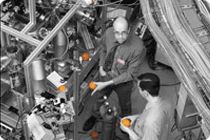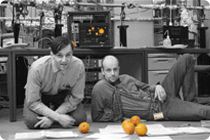Robert Henke aka Monolake: Mono On Mono -- Robert Henke celebrates 10 years of minimalism in music-making
Robert Henke is part mastering engineer, part vintage synthesizer collector, part software programmer and a cornerstone of Berlin's vibrant electronic music scene. Henke has been performing and recording for a decade under the name Monolake, an open project dedicated to computer-generated sound. Splitting his time between conceptualizing Ableton's newest instruments and effects and making his own brand of techno music, Henke is obsessed with music technology and the sounds achieved through synthesizers and sample manipulation. His balance as software/instrument creator and musician is at once rare and modern. It is also a time-consuming affair. The average week for Henke may involve gigs in Tokyo, a workshop on Ableton Live and hundreds of e-mails with the Ableton development team. But give Henke the chance to talk shop and reflect on ten years of creating Monolake music (or his new Robert Henke concept projects, such as a computer-generated thunderstorm), and he leaps at the chance. Recently we caught up with Henke in Berlin on his press tour for Polygon_Cities:, his latest Monolake collaboration with another Berlin electronic musician, T++.
How has Ableton Live influenced your music-making process?
Before Live, the only way for me to realize my musical ideas was through writing Max/MSP patches, which was very time consuming. I learned a lot, but I don't feel like spending so much time on this anymore — I prefer to focus on musical questions. Live gives me the headroom to spend my time sculpting my sounds instead of my tools. At least as long as I stay away from thinking about the software itself while using it.

Which Live 5 feature are you the most excited about?
In the case of Live 5 my answer is clear: everything. I love the multiple clip selection, because it is such a huge time-saver. I often make lots of edits, and the ability to change them all at once is great — should have been in since Live 1. The Saturator effect will also be a frequent guest in my studio tracks, and Beat Repeat will be used on stage. I am also looking forward to better integration with my hardware studio, thanks to latency compensation. Ah, and I will buy a Mackie Control! Live 5 makes me really happy. I've never felt more comfortable with a release.
Which features were you most involved in developing?
I am always especially involved in the creation of the effects and instruments. They are, to a great extent, my babies. But everything at Ableton is teamwork. Given this, I would say that my main contribution to Live is discussion. I have strong opinions about specific details, and so do the others. We keep discussing features until they really feel good; that's one of my most important and often almost painful jobs. Sometimes I have to realize that I am not the only one who's right. Also, I am the most demanding and critical user of the program. I find bugs and I test it under real-world conditions on stage and at home simply by using it every day. And since I tour quite often, I collect requests from users and look carefully at how other people use the software. You can learn a lot from this.
Can you describe your typical music-making process?
I create a groove, play with it, add some sounds. At some point I find a specific element that I regard as especially interesting; this sets the direction for the rest of the work. Often the final result contains almost none of the elements from the beginning of the session. It is very important for me that the groove is unthinkable without the sound, that I cannot replace a single sound or effect without changing the overall impression of the music. I am very into creating spatial depth around my grooves, and the way sounds interact with each other is very important. Technically, I use hardware synthesizers more often than software synths, apart from those I've created myself such as the Operator. Then I record sounds or whole sequences into Live and do the arranging there. I often make lots of versions of a piece and keep them for a while. Later I decide which one I like best.
What advice would you give the Ableton newbie?
I believe that we often spend too much time worrying about specific details instead of focusing on the main thing. After all, it does not matter so much which plug-in you use, or which sound card. Also it does not matter if a specific DJ is god, good or not so good.
To a music beginner, I would advise experimenting as much as possible. Try out everything, and don't worry too much about it being good. If it is fun to do, it is good. Period. And since it is made in Live, keep the data somewhere. Maybe years later you will listen to it again and discover that it is almost perfect as it is, and that with some slight changes it makes a great piece of music.
Do you ever find yourself too caught up in the details of the software to make music?
I had this problem more before there was Live. I spent an incredible amount of time creating my own tools in Max/MSP. Now Live is in a state where I do not need to do this anymore, and the rest of the studio is also in good shape, which means that I turn it on and can immediately start recording and editing. My main challenge is the temptation to switch from making music using Live to thinking about Live itself, from the Monolake mode to the Ableton mode.

Do you have any favorite trick or tip that you'd like to pass along?
No, it is a collection of small details. Maybe as a general rule I would say that if a song does not sound right, try deleting material instead of adding it. Most great songs are surprisingly simple. It is more about finding the one thing that makes it instead of stacking up tons of ideas on top of each other. But, of course, this also varies from genre to genre — and minimalist techno is per definition minimal. Still, the fewer elements something contains, the more care is needed for each one individually, since it is more exposed. A good track is usually the result of lots of work, even if it is, in the end, simple. My personal trick for getting a unique sound: Use your own sounds for everything. No need for tons of sample CDs. No need for another 808 bass drum.
How do you integrate hardware with your Live setup?
I create a MIDI track, draw/record a pattern and pass it to the hardware synths. The result is recorded as audio into Live. Or I just play with my hardware to get a specific pad or percussion sound and then record it. Then I consolidate the most exciting part of it and keep it in my library. When I make a new piece, I browse the library if I need a sound that I think I may have already made. Once I've created audio files, they can be easily stored in Live, so I tend to get the hardware recorded as early as possible. The hardware studio provides the colors, and Live is the brush and the canvas.
Do you use a MIDI keyboard/controller?
In the studio, not yet. This will change with Live 5's new hardware controller support. I am very curious about how this is going to change my work. I have a lot of MIDI keyboards, and I am surrounded by synths in my studio.
Can you tell us a bit about your "Monodeck:" controller?
On stage, the mouse is not acceptable. On stage, I need to move, dance around and touch the instrument with both hands. The "Monodeck:" allows me to control most aspects of my Live performances without touching the notebook. I can launch clips and adjust effects and the mix. It took quite some time to make it, but it was one of the best decisions I ever made. It changed the way I work on stage dramatically. It turned Live into a true sequencing instrument. I actually coined that term once.
What was your biggest challenge with making Polygon_Cities:?
To focus on music instead of trying to improve the studio or think about a better Live. I spent a good amount of time finding spare parts and technical advice in order to get the Synclavier in halfway-working condition. This took a lot of time, but the inspiration I get out of the sounds is worth the effort. Musically, the challenge was to move from working alone to working as a team again, since T++ was so involved in the making of Polygon_Cities:. We had to find a common language and working mode that both technically and aesthetically met our needs. Most of the work we did in the beginning we simply trashed later. Then the inspiration came in a sudden burst of confidence. Now Polygon_Cities: feels to us like the first rough draft of something we will explore further in the future: creating techno beyond the usual grooves and sounds.
What are your weaknesses as a musician?
I cannot play an instrument. I cannot remember melodies. I cannot sing. I have bad timing. I know way too little about counterpoint. I am just someone who is addicted to sound and who under any circumstances wants to create music with electronic instruments. This is what has kept me doing it for almost 20 years.